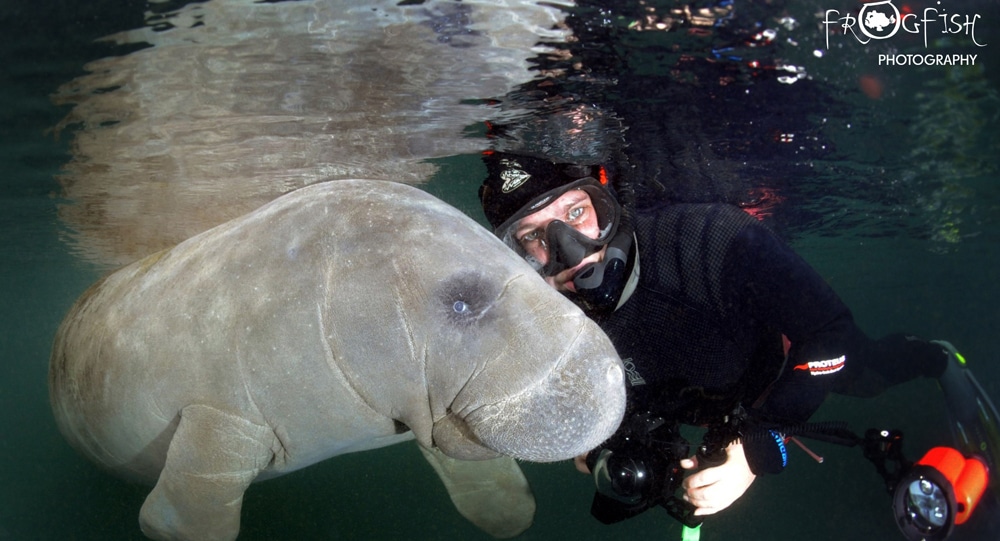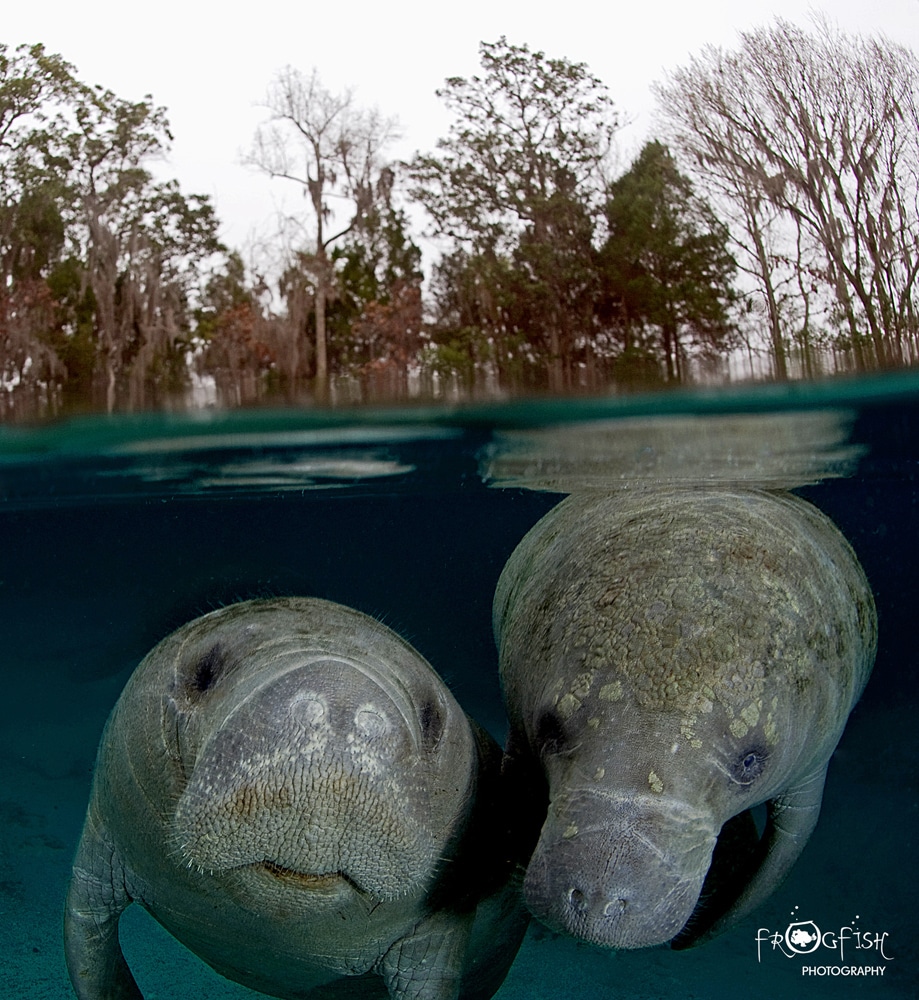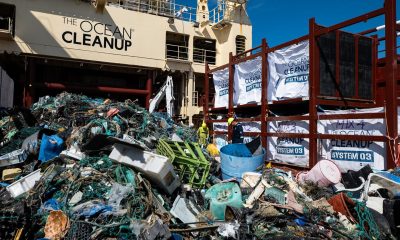Marine Life & Conservation
Seagrass Awareness Month shines spotlight on critical food source for Manatees

![]() March is Seagrass Awareness Month, and there has never been a more critical time to act to protect seagrass communities across Florida. This year to date, the Florida Fish and Wildlife Commission (FWC) has reported 326 known manatee mortalities, very close to the high number during this same period in 2021. A total of 1,101 manatee deaths were recorded in 2021, a number far higher than in any other year since record keeping began 50 years ago. Many of those deaths were reported in and around the Indian River Lagoon, where nutrient pollution, resulting in algae blooms, has led to catastrophic loss of seagrass.
March is Seagrass Awareness Month, and there has never been a more critical time to act to protect seagrass communities across Florida. This year to date, the Florida Fish and Wildlife Commission (FWC) has reported 326 known manatee mortalities, very close to the high number during this same period in 2021. A total of 1,101 manatee deaths were recorded in 2021, a number far higher than in any other year since record keeping began 50 years ago. Many of those deaths were reported in and around the Indian River Lagoon, where nutrient pollution, resulting in algae blooms, has led to catastrophic loss of seagrass.
Manatees are herbivores and feed on a variety of submerged, emergent, and floating plants including seagrass. There are seven species of seagrass in Florida, and manatees are known to consume all of them. But this critical food source is threatened, nowhere more so than in the Indian River Lagoon (IRL)—a critical manatee habitat—where a series of human-induced harmful algal blooms have caused the loss of more than 90% of the area’s seagrass biomass. Lack of food in this region has contributed to increased reports of malnourished manatees and unprecedented numbers of manatee deaths.
“Manatees and seagrass communities have co-evolved over millions of years. Seagrass Awareness Month is an important opportunity to spotlight this critical aquatic resource,” said Patrick Rose, Aquatic Biologist and Executive Director of the Save the Manatee Club, “Uncontrolled development, lax regulation, and the resulting pollution from Florida’s growing human population has fed the cycle of algae blooms that cause seagrass loss.”
Save the Manatee Club has a long and continuing history of working with partners to rehabilitate and protect Florida’s waterways, including helping fund research efforts to monitor the state of the Indian River Lagoon and recently opposing House Bill 349 and Senate Bill 198, the so-called “seagrass mitigation bills” that would in fact have been detrimental to seagrass and manatee populations. Additionally, last month Save the Manatee Club partnered with the Center for Biological Diversity and Defenders of Wildlife to file a lawsuit against the U.S. Fish and Wildlife Service (FWS) for failing to revise outdated critical habitat for Florida manatees and have put the Environmental Protection Agency on official notice of the groups’ intent to sue over failed water quality standards that have led to these massive seagrass losses.
The Club is also a founding member and fiduciary sponsor of a network of partners who help rescue and rehabilitate sick or injured manatees, including those that are severely malnourished.
Members of the public can do their part to protect seagrass and manatees by:
- Helping to reduce pollution from yard chemicals, which prevents harmful algal blooms from forming;
- Preventing damage to seagrasses by avoiding boating over seagrass beds or trimming up the boat’s motor and idling to a safe depth before getting on plane;
- Resisting the urge to feed or give water to manatees which is illegal and teaches them to associate people and/or boats with handouts, changing their behavior and putting them in harm’s way.
- Reporting distressed, sick, injured, or dead manatees at 1-888-404-FWCC (3922);
- Contacting local, state, and federal elected officials to urge them to help manatees and restore the Indian River Lagoon.
Aquatic Biologist Rose concluded: “Everyone must act now—from the individual members of the public, to governmental and nonprofit organizations, to our elected officials—to disrupt the cycle of pollution in our waterways. We must protect and rebuild the seagrass communities that are essential to the survival of manatees and a host of other species including fishes, dolphins, sea turtles and birds that collectively depend on this critical aquatic resource.”
For more information about manatees and the Club’s efforts, visit savethemanatee.org
Blogs
The Ocean Cleanup Breaks 10,000,000 KG Barrier

The Ocean Cleanup, the global non-profit project, has removed a verified all-time total of ten million kilograms (22 million lbs.) of trash from oceans and rivers around the world – approximately the same weight as the Eiffel Tower.
To complete its mission of ridding the oceans of plastic, The Ocean Cleanup uses a dual strategy: cleaning up the Great Pacific Garbage Patch (GPGP) to remove the plastic already afloat in the oceans, while stopping the flow of plastic from the world’s most polluting rivers.
Through cleaning operations in the GPGP and in rivers in eight countries, the cumulative total of trash removed has now surpassed ten million kilograms. This milestone demonstrates the acceleration of The Ocean Cleanup’s impact, while underlining the astonishing scale of the plastic pollution problem and the need for continued support and action.
While encouraging for the mission, this milestone is only a staging point: millions more tons of plastic still pollute our oceans and The Ocean Cleanup intends to continue learning, improving and innovating to solve this global catastrophe.
This announcement comes as governments from around the world meet to continue negotiations to develop a new legally binding instrument to end plastic pollution at INC4 in Ottawa, Canada. Representatives of The Ocean Cleanup will be in attendance and the organization will be urging decision-makers to collaborate towards a comprehensive and ambitious global treaty which addresses plastic at all stages of its life cycle and in all marine environments worldwide, including in areas beyond national jurisdiction.
It is encouraging to see that the need for remediation is reflected in the various options for potential treaty provisions. It is essential that the final treaty contains clear targets for the remediation of legacy plastic pollution, and reduction of riverine plastic emissions.
Tackling plastic pollution requires innovative and impactful solutions. The treaty should therefore incentivize the innovation ecosystem by fostering innovations that make maximal use of data, technology and scientific knowledge – such as those designed and deployed by The Ocean Cleanup.
‘After many tough years of trial and error, it’s amazing to see our work is starting to pay off – and I am proud of the team who has brought us to this point.’ said Boyan Slat, Founder and CEO of The Ocean Cleanup. ‘While we still have a long way to go, our recent successes fill us with renewed confidence that the oceans can be cleaned.’
The Ocean Cleanup was founded in 2013 and captured its first plastic in 2019, with the first confirmed catch in the GPGP coming soon after the deployment of Interceptor 001 in Jakarta, Indonesia. After surpassing one million kilograms of trash removed in early 2022, the non-profit project has since progressed to the third iteration of its GPGP cleaning solution, known as System 03, and a network of Interceptors currently covering rivers in eight countries, with more deployments set for 2024.
About The Ocean Cleanup
The Ocean Cleanup is an international non-profit organization that develops and scales technologies to rid the world’s oceans of plastic. They aim to achieve this goal through a dual strategy: stemming the inflow via rivers and cleaning up the legacy plastic that has already accumulated in the ocean. For the latter, The Ocean Cleanup develops large-scale systems to efficiently concentrate the plastic for periodic removal. This plastic is tracked and traced through DNV’s chain of custody model to certify claims of origin when recycling it into new products. To curb the tide via rivers, The Ocean Cleanup has developed Interceptor™ solutions to halt and extract riverine plastic before it reaches the ocean. Founded in 2013 by Boyan Slat, The Ocean Cleanup now employs a broadly multi-disciplined team of approximately 140. The foundation is headquartered in Rotterdam, the Netherlands.
For more information, visit: theoceancleanup.com and follow @theoceancleanup on social media.
Marine Life & Conservation
Steve Backshall to headline Shark Trust’s flagship event: For the Love of Sharks

Join a host of amazing, shark loving, speakers including Steve Backshall and the Shark Trust team for an evening celebrating shark conservation at the Royal Geographical Society in London this November.
Date: 29th November 2024
Time: 6-10pm
Location: Royal Geographical Society, London
Tickets: https://www.sharktrust.org/Event/flos24
The event will be a celebration of all things shark. Those lucky enough to get hold of tickets will hear from engaging guest speakers with a passion for sharks.
The line-up includes (*subject to change if unforeseen circumstances arise)
Steve Backshall: One of television’s busiest presenters, BAFTA award-winning wildlife expert Steve has been passionate about the wild world ever since he was young.
Steve’s impressive TV career has taken him all around the world, investigating a wide array of species and environments. Steve has filmed over 100 hours of children’s wildlife programmes with the BAFTA award winning Deadly 60 franchise and recently, with Sky Nature, for his new series ‘Whale with Steve Backshall’. He has been a patron for the Shark Trust for 10 years.
Simon Rogerson: is a photojournalist specialising in natural history, diving and the sea.
He is editor of SCUBA magazine, the official journal of the British Sub-Aqua Club. Simon started his career as a crime reporter but gravitated towards his ‘less depressing’ interest in underwater exploration, joining the staff of DIVE magazine in 1999. In 2005 he was named ‘Editor of the Year’ in the PPA’s Independent Publishing Awards. Simon also works as a freelance writer, contributing frequently to the Sunday Times and Telegraph, in addition to BBC Wildlife, Esquire, and a host of international diving magazines. He is the author of a book, Dive Red Sea, published by Ultimate Sports. Now based in Berkshire, Simon has been a Patron of the Shark Trust for 20 years.
More speakers to be announced soon. Head to the Shark Trust website to learn more.
The evening will also allow guests the final chance to see the Oceanic 31, shark art exhibition. Some of the artwork will be auctioned/raffled at the event, while the rest will be auctioned online to raise money for the Shark Trust Oceanic Programme.
For the Love of Sharks is an evening with something for everyone who is interested and fascinated by sharks. Join the Shark Trust, their Patrons, Trustees and Staff, along with a host of supporters for this celebration of shark conservation.
For more information or to buy a ticket: https://www.sharktrust.org/Event/flos24
-

 News3 months ago
News3 months agoCapturing Critters in Lembeh Underwater Photography Workshop 2024: Event Roundup
-

 Marine Life & Conservation Blogs3 months ago
Marine Life & Conservation Blogs3 months agoCreature Feature: Swell Sharks
-

 Blogs2 months ago
Blogs2 months agoMurex Resorts: Passport to Paradise!
-

 Blogs2 months ago
Blogs2 months agoDiver Discovering Whale Skeletons Beneath Ice Judged World’s Best Underwater Photograph
-

 Gear Reviews3 weeks ago
Gear Reviews3 weeks agoGEAR REVIEW – Revolutionising Diving Comfort: The Sharkskin T2 Chillproof Suit
-

 Gear Reviews3 months ago
Gear Reviews3 months agoGear Review: Oceanic+ Dive Housing for iPhone
-

 News2 months ago
News2 months agoPADI Teams Up with Wellness Brand Neuro to Drive Ocean Change and Create a Blue State of Mind
-

 Marine Life & Conservation2 months ago
Marine Life & Conservation2 months agoSave the Manatee Club launches brand new webcams at Silver Springs State Park, Florida


















